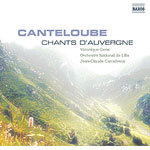
Chants d'Auvergne (Selection)
 $25.00
Out of Stock
$25.00
Out of Stock6+ weeks add to cart
JOSEPH CANTELOUBE
Chants d'Auvergne (Selection)
Veronique Gens (soprano) / Lille National Orchestra, Jean-Claude Casadesus, conductor
[ Naxos / CD ]
Release Date: Saturday 2 April 2005
This item is currently out of stock. It may take 6 or more weeks to obtain from when you place your order as this is a specialist product.
"This recording is so distinctive that I've little doubt it will be the definitive Chants d'Auvergne for many years to come. Gens raises Naxos's artistic image by her brilliance, and this recording will sell, and sell, and sell ......" - Anne Ozorio
"Véronique Gens has easily one of the most exquisite voices in the business today; moreover anything she does is uncommonly intelligent and musically informed. With this recording Naxos enters the echelons of upmarket performances. In this material, Gens outclasses Kiri te Kanawa in terms of vocal beauty and is in an altogether different league interpretatively. She is even a match for the venerable recording made by the late Victoria de los Angeles. Indeed, she may even have an edge over her competitors, for Gens is a native of the Auvergne. She would have grown up well aware of the history and traditions of regional culture. I have no idea whether she speaks the dialect, but her way with these texts is natural and instinctive.
In our age of cultural homogeneity, it's hard to appreciate what regional identity meant in an earlier age, and how important it was. Canteloube was called "le bard d'Auvergne" because he was passionately involved in preserving the folklore and music of his native land. At the turn of the century many composers returned to folk idiom for inspiration - Vaughan Williams, for example - but Canteloube was himself a genuine man of the people, so to speak, who had grown up in the countryside. When he went to farms and villages to collect folk music, he could communicate as an equal, without condescension. His music therefore has a particularly vivid, exotic feel to it. There are echoes of a musical tradition outside the mainstream, shaped by the mountainous isolation of many parts of the Auvergne. Many of Canteloube's songs are also informed by "medieval" music, and the romance of the troubadour tradition. The Trois Bourrées could have stepped out from a medieval fair. This is yet another reason why Gens carries this music off with such verve; her background is in early music and the baroque. She approaches songs like Lou bousu and Malurous qu'o uno fenno with vigour, understanding the earthy nature of pre-modern music. These songs are not technically challenging, but they need to be sung without affectation or condescension.
Casadesus conducts with great flair, making the most of the flamboyant gestures and joyful rhythms. The orchestra is very focused and expressive. Special mention too should be made of soloists like the horn player in La delaïssádo and the pianist in Passo pel Prat. This recording is so distinctive that I've little doubt it will be the definitive Chants d'Auvergne for many years to come. Gens raises Naxos's artistic image by her brilliance, and this recording will sell, and sell, and sell ......"
-- Anne Ozorio, MusicWeb, 15 February 2005
Tracks:
01. La pastoura als camps (The Shepherdess in the Fields) 02:47
02. Bailero 05:14
03. L'aio de rotso (Spring Water) 03:09
04. Ound' onoren gorda? (Where shall we find our flock?) 02:34
05. Obal din lou Limouzi (Down in Limousin) 01:15
06. Pastourelle (Shepherdess) 03:19
07. L'Antoueno (Antoine) 03:16
08. N'ai pas ieu de mio (I have no girl) 04:41
09. Lo calhe (The Quail) 01:43
10. La delaissado (Deserted) 04:08
11. Passo pel prat (Go through the meadow) 03:23
12. Lou boussu (The Hunchback) 02:25
13. Brezairola (Lullaby) 03:15
14. Malurous qu'o uno fenno (Unfortunate he who has a wife) 01:33
15. Jou l'pount d'o Mirabel (By the Bridge of Mirabel) 04:00
16. Oi ayai (Oh! Ah!) 03:03
17. Lou coucut (The Cuckoo) 01:52
18. Quand z'eyro petitoune (When I was little) 02:57
19. La-haut, sur le rocher (Up there, on the rock) 03:48
20. Uno jionto postouro (A pretty shepherdess) 02:41
21. Lou diziou be (They said) 01:21


